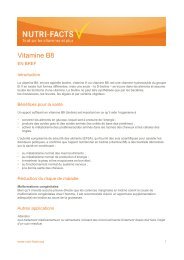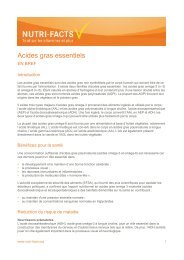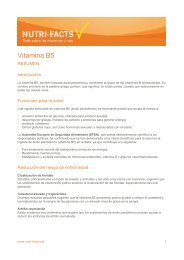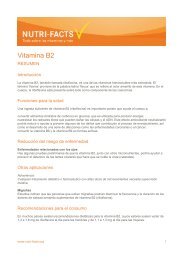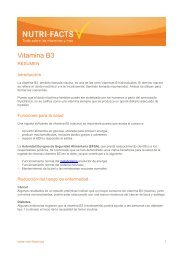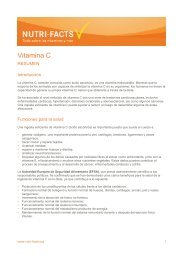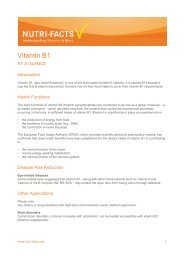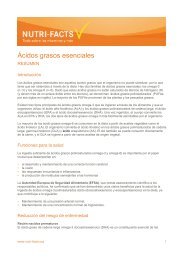Vitamin E - Nutri-Facts.org
Vitamin E - Nutri-Facts.org
Vitamin E - Nutri-Facts.org
Create successful ePaper yourself
Turn your PDF publications into a flip-book with our unique Google optimized e-Paper software.
To minimize risk of these eye disorders, experts advocate diets high in vitamin E and vitamin C, and<br />
carotenoids.<br />
Immune function<br />
<strong>Vitamin</strong> E has been shown to enhance specific aspects of the immune response that appear to decline as<br />
people age. A clinical trial in elderly nursing home residents reported that daily supplementation with vitamin<br />
E lowered the risk of upper respiratory tract infections, especially the common cold, but had no effect on<br />
lower respiratory tract (lung) infections.<br />
More research is needed to determine whether supplemental vitamin E may protect the elderly against the<br />
common cold or other infections (e.g., flu).<br />
Cancer<br />
Clinical studies have shown that people with cancer often have lower levels of vitamin E in the blood. In<br />
addition, population trials suggest that diets rich in antioxidants, including vitamin E, may be connected to a<br />
reduced risk of certain types of cancer.<br />
Experiments have shown that vitamin E inhibits the growth of some cancers in test tubes and animals,<br />
particularly hormone responsive cancers such as breast and prostate cancer. While these results are<br />
encouraging, the confirmation of these findings by large-scale human studies is still pending.<br />
More research is needed before researchers can come to any firm conclusions about whether added vitamin<br />
E, alone or together with other antioxidant micronutrients, has an impact on cancer in humans and, if so,<br />
what the optimal dosage is.<br />
Alzheimer’s disease<br />
Since researchers believe oxidative stress contributes to the development of Alzheimer’s disease,<br />
antioxidants like vitamin E could potentially help prevent this condition. The fat-soluble vitamin can readily<br />
enter the brain and exert its antioxidative properties.<br />
Clinical studies have suggested that vitamin E supplementation, together with vitamin C, may prevent the<br />
development of Alzheimer’s disease.<br />
Other Applications<br />
Please note:<br />
Any dietary or drug treatment with high-dosed micronutrients needs medical supervision.<br />
Heart disease<br />
Results of clinical trials using vitamin E to treat heart disease have been inconsistent. More evidence is<br />
needed to determine if there are benefits of vitamin E supplementation.<br />
Diabetes<br />
People with diabetes are at increased risk for conditions such as cardiovascular disease. A potential factor<br />
involved in these complications may be low levels of antioxidants, which is frequently observed in these<br />
patients. <strong>Vitamin</strong> E supplements and other antioxidants may help reduce the risk of heart disease and other<br />
complications in people with diabetes.<br />
There is evidence that vitamin E may reduce the risk of cardiovascular problems in type 2 diabetics with a<br />
particular type of gene found in 36% of the general population.<br />
Research indicates that antioxidants might help control blood sugar levels and lower cholesterol levels in<br />
those with type 2 diabetes while protecting against the complications of eye damage (‘retinopathy’) and<br />
kidney damage (‘nephropathy’) in those with type 1 diabetes.<br />
www.nutri-facts.<strong>org</strong> 2



